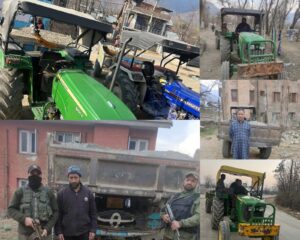Sometimes We Suffer From Inside!

Life isn’t about avoiding pain. It’s about how we choose to face it, how we choose to show up for each other. In a world full of judgment and fear, it’s the quiet acts of kindness that make the most noise. So the next time someone struggles, don’t look away. Be the person who reaches out, who offers a hand, who understands that sometimes, the greatest act of love is simply showing up.Life is a series of quiet revolutions, moments where everything shifts—friendships fade, bonds are tested, and the world around us transforms in ways we never saw coming. Often, the hardest battles are fought in silence, within our hearts, invisible to those around us. I want to share a part of my journey, a story of inner suffering, unexpected distance, and the power of silent support.After graduation, I felt like I was on the edge of something beautiful. I entered University of Kashmir with wide-eyed excitement and anticipation, ready for new experiences and friendships. The campus was alive with energy—from the lectures to the serene walks around Naseembagh, everything seemed to be in perfect harmony. But life, as it often does, had its own plans.In my first semester, I was hit by something I didn’t expect—a sudden, unexplainable shift in my health. The changing seasons seemed to trigger my blood pressure to swing unpredictably, sometimes spiking to dangerous levels, other times plummeting. It wasn’t something I could control, and the physical toll was exhausting. What made it worse was the way I began to feel inside—hopeless, weak, and disconnected from everything I once felt confident about.
But I refused to let it defeat me. My goal was simple: pass my exams. Despite the dizziness, the sleepless nights, and the constant monitoring of my vitals, I kept pushing forward. Every day felt like a small victory. I wasn’t just battling the illness; I was battling the feeling of being less than, of being somehow inadequate because I couldn’t be the person I once was.
During those months, there was one person who made the difference. Irfan Akbar, a friend from my bachelor’s days, stood by me through it all. Irfan didn’t hesitate for a moment—he’d ride his scooter across the city, picking me up to take me to the doctor, never once asking for anything in return. His kindness was a quiet constant in the storm, a reminder that true friendship isn’t about the good times but the hard ones.
But not everyone responded with such compassion. One friend, someone I had grown close to, began to distance himself. He was the most religious of our group, and before my health issues, we’d share everything—meals, conversations, even our cups. But after my illness began, something changed. He refused to share a cup with me. A small thing, perhaps, but in that moment, it felt like a symbol of how others sometimes view those who are struggling—something to be avoided, something to be feared.
I couldn’t understand it. My condition wasn’t contagious. It wasn’t a moral failure. Yet, here was a person who had once been so close, now distancing himself, not out of concern but out of fear. I often found myself wondering if it was my illness that had made me less than—less worthy of the same kindness, less deserving of the same care.
That was a painful realization. Sometimes, people will make you feel like you’re a burden. They’ll pull away, not because they don’t care, but because they don’t know how to handle what they don’t understand. They don’t see that behind every illness, every struggle, there’s a person fighting to keep going, fighting to stay present, even when their body is telling them to give up.
I’ve learned that no one is exempt from inner struggles. We all carry burdens that others can’t see—whether it’s physical pain, emotional exhaustion, or a battle with our own minds. But it’s not the burden that defines us; it’s the way we choose to handle it, the way we choose to show up for others.
In my own battle, I tried to be that person for others. I tried to be the friend who offered support, even when I was struggling myself, because I knew what it felt like to feel invisible, to feel like no one saw the weight of what you were carrying. And I realized that, in those moments, the smallest acts of kindness matter most. A kind word, a listening ear, a simple gesture of support—these are the things that can change someone’s world.
There were times when I felt the sting of other people’s ignorance. Friends would tease me about my blood pressure, as if it was something to laugh at. “How’s your blood pressure today?” they’d ask, as if it were a joke. And it stung every time. They didn’t understand how it felt to live with it, how it felt to be constantly aware of your body’s limits. They didn’t understand that it wasn’t something I could control, something I wanted. It wasn’t just an inconvenience—it was a real, physical pain, one that made me feel both weak and strong at the same time.
I’ve also learned that appearances can be deceiving. It’s easy to assume someone is kind or spiritual because they wear a certain look or speak a certain way. But I’ve seen many who outwardly embody their faith, only to reveal an absence of empathy when it truly matters. A person who looks religious is not always the one who acts with kindness. True spirituality isn’t in how we dress or what we say—it’s in how we treat others, especially when no one is watching.
So, my message is this: be calm, be humble, and above all, be kind. You never know what the person standing next to you is going through. If you can’t understand their struggle, at least respect it. If you can’t fully empathize, at least offer compassion.





